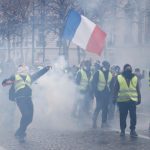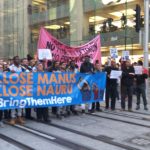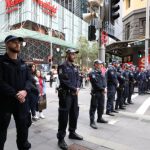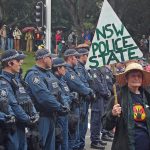Revolution of Our Times: An Interview With Hong Kong Protester Silver Lee
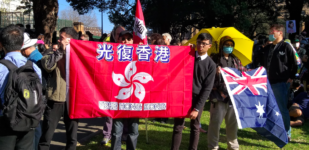
The anti-extradition bill rallies in Hong Kong are now in their twelfth week. On Sunday 18 August, an estimated 1.7 million demonstrators – a quarter of the population – took to the city streets to protest in torrential rain.
And last weekend saw an escalation in violence, as police fired a live bullet for the first time and two water cannons were deployed to control the crowds. Of the 86 people arrested – on charges of peaceful assembly, possessing a weapon or assaulting police – one was a 12-year-old child.
Two weeks ago, Beijing began amassing thousands of troops in Shenzhen: a city near the China-Hong Kong border. And these People’s Armed Police have been carrying out daily simulation drills in the sports stadium ten minutes away from the border crossing.
In Australia, clashes have broken out between Hong Kong pro-democracy protesters and Communist China supporters on university campuses nationwide, while a fortnight ago, police had to break up confrontations between the two sides on Sydney and Melbourne city streets.
Liberate Hong Kong
The protests that began on 9 June were sparked by a piece of legislation that would allow for Hong Kong citizens to be extradited to territories the city doesn’t have extradition agreements with, including mainland China. And many fear this would place HK citizens under China’s jurisdiction.
Days later, Beijing-appointed Hong Kong chief executive Carrie Lam Cheng Yuet-ngor agreed to suspend the passage of the bill in the Hong Kong Legislative Council. However, she refused to withdraw it completely.
Five key protest demands have developed: the withdrawal of the extradition bill, the establishment of a body to investigate police violence, a halt to the mischaracterisation of the protests as riots, an amnesty for those arrested, and the enactment of reforms that would provide for free HK elections.
The beleaguered Carrie Lam announced on Tuesday that she hasn’t lost control of the city. The HK chief executive has vowed to “restore law and order” and she’s outright rejected the demands of protesters.
Diminishing democracy
Of course, with the large numbers of troops along the border, there are fears that Beijing could send them in to deal with the ongoing unrest, in a similar manner as in 1989, when troops were deployed to the Tiananmen Square protests, which resulted in the deaths of thousands of Chinese citizens.
And the protests have also raised grave questions over the fate of Hong Kong citizens once the territory becomes fully integrated into mainland China. At present, the city exists under the “one country, two systems” principle that’s operated since British handover in 1997.
Sydney Criminal Lawyers spoke to Hong Kong citizen and Australian resident Silver Lee about Beijing’s creeping control over the HK populace, the likelihood that president Xi Jinping will send in the troops, and his hopes for the future of his city.
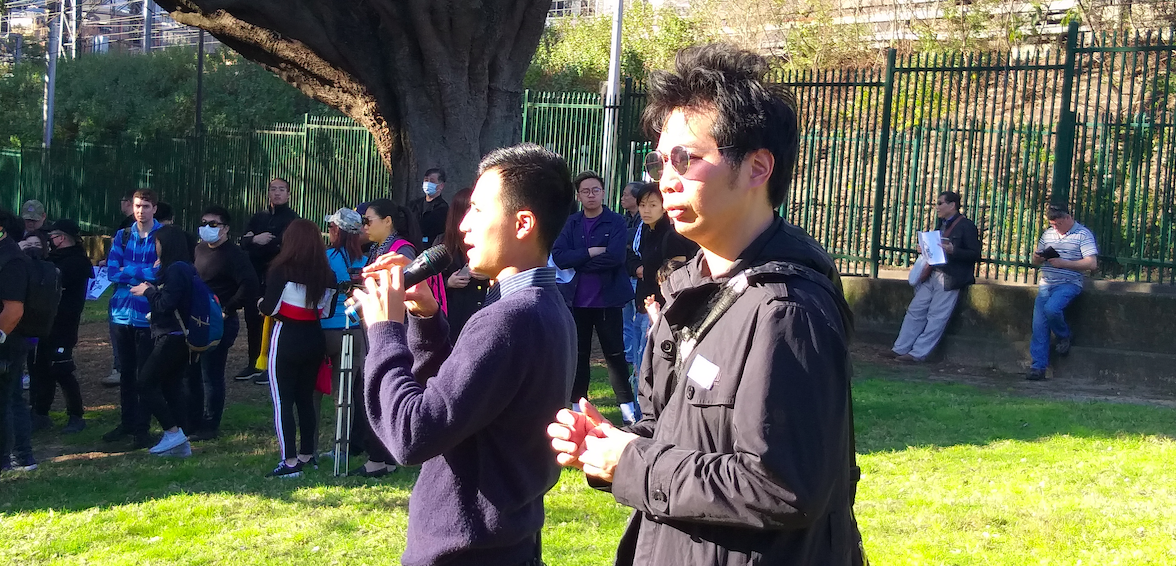
Firstly, last weekend saw an escalation in violence between Hong Kong protesters and local police. Mr Lee, how would you describe the situation in Hong Kong at present?
The situation is just like in a time of war. And it’s getting worse, because the Hong Kong police have been charged by the Hong Kong SAR chief executive to use more violence and power to suppress protesters.
When will the next protest actions be taking place?
Right now, they propose some movements for 31 August. They will have a protest and a rally. And on 2 September, they will strike and won’t go to work or school. They will strike in Hong Kong.
But, the most important one is on 31 August. This is when the Chinese government proposed the election of the chief executive five years ago. So, they will organise a protest on this day in Hong Kong.
What about in Australia?
On 31 August, we are organising different protests. In Melbourne, we are organising an assembly. And in other cities, we are organising demonstrations.
Are you expecting that the government in Beijing will accept the demands of the Hong Kong protesters anytime soon?
No. I don’t think so. In this situation, the Beijing government doesn’t want to do anything. They can’t. If they accept the requirements of the Hong Kong people, other states will organise protests against the Chinese government as well.
These protests were sparked over an extradition bill the Lam government introduced into the HK Legislative Council earlier this year. Why are the provisions of this piece of legalisation so problematic?
This is a big problem, because first of all, if you look at the global justice ranking, Hong Kong is 16th, while China is 82nd in the world. So, we don’t have fair justice in China. This is ridiculous, because we know there is no justice equality in China.
One worker in the British consulate in Hong Kong was arrested by the Chinese government, when this guy took the train to China.
Everyone knows – even without the extradition law or having committed any offence in China – you can be arrested by the Chinese government for many different reasons.
When did consulate employee get arrested?
A couple of days ago.
This was a Hong Kong citizen?
Yes. He is a Hong Kong citizen working in the British consulate.
And he was arrested when he went to the mainland?
Not the mainland. There is a high-speed train between Hong Kong and China. And in the Hong Kong area, Chinese police have the right to maintain order.
They have the jurisdiction to make an arrest in parts of Hong Kong?
Yes. They have the jurisdiction in that area of Hong Kong. When you go into that area, Hong Kong police can’t help you, even though it is Hong Kong.
As the protests have continued over the last 12 weeks, the demands of the millions of demonstrators have broadened. What other objectives are important to HK protesters?
First of all, we expect the Hong Kong government to withdraw the extradition law, because now we’re asking for one thing, which is to liberate Hong Kong and revolution time. This is our slogan. Our slogan in Hong Kong now is “Liberate Hong Kong; revolution of our times.”
We don’t want a total revolution. We just want a democracy and the Chinese government to fulfil their promise and have universal suffrage, according to the Basic Law in Hong Kong.
Why does the Hong Kong government want the extradition bill?
According to some sources, which can’t be verified, the extradition law is a tool to arrest political people in Hong Kong.
In the Chinese government, they still have some parties even under Communism. The Chinese president Xi Jinping is in one party. And he would like to use this law on those in another party.
Beijing has amassed thousands of troops, as well as tanks in Shenzhen, close to the border with Hong Kong. The Chinese Communist Party has warned that it has the right to intervene. How much of a concern is it that Chinese mainland troops could be sent in?
We’re not worried about that. They must not send the army to Hong Kong, because they can’t repeat the tragedy of the Tiananmen Square massacre.
In 1989, they suppressed the students with the tanks and the army. They can’t do this again. They will not.
The Chinese government has already sent some troops to Hong Kong to support the Hong Kong police. They are already there to suppress the Hong Kong protests.
So, there are already Chinese troops there?
Yes. There are already Chinese army troops in Hong Kong.
After the magnitude of these protests, Hong Kong chief executive Carrie Lam remains unmoved. She’s suspended the extradition bill, but she hasn’t withdrawn it.
How do the people of Hong Kong feel about the way Carrie Lam has handled the situation? What do they believe should happen to the Lam government?
Hong Kong people are very disappointed. And they think that the Hong Kong chief executive Carrie Lam has done nothing. She has never responded to the Hong Kong people’s requirements. Hong Kong people have lost their patience with her. They don’t trust her anymore.
We can’t change our chief executive. The election of our chief executive in Hong Kong is controlled by the Chinese government. We can’t do anything. We can’t trust her.
And she can’t be the chief executive in the next period. She should just complete her five year period and then leave her position.
Since the British handover in 1997, Hong Kong has existed as part of China, under the “one country, two systems” principle. But, this period runs out in 2047.
At that time, Hong Kong is supposed to become a fully integrated part of China. How are young Hong Kong citizens feeling about that prospect?
Young people are going out to protest, because they can’t see their future now. Three years ago, Chinese president Xi said that the Chinese government can control and govern the Hong Kong government completely.
The Chinese government wants to do “one country, one system” in Hong Kong. If Hong Kong is part of China – or one of the Chinese cities – Hong Kong won’t have any advantages or good points in the world.
If you want to destroy the city of Hong Kong, you just have to take away the good points and the advantages of the city. If Hong Kong is a part of China, we will be just like any other Chinese city. We won’t have a good economy. We won’t have a developed political and social system.
So, under this situation, Hong Kong young people can’t see the future. They can’t expect a good future is waiting for them. And this is why they’ve come out to protest.
And lastly, Mr Lee, these large-scale protests have been continuing on for three months. The demands of protesters have evolved. The prospect of eventually becoming a part of mainland China is under question.
How do you see this developing from here? What needs to happen in order for the protesters to feel they no longer need to demonstrate?
Now, the Hong Kong SAR are using a method to control the protesters that’s just like in a war. They’ve taken a long time and are just trying to consume our energy, money and resources. The Hong Kong government is using this method to consume our energy and resources.
However, we keep protesting in Hong Kong. We will be organising some protests in particular. One is on 28 September, which is the fifth anniversary of the Umbrella revolution 2014. So, five years later, we are organising a protest on that day.
Another one is on 1 October, as this is when the People’s Republic of China was established 70 years ago.
So, in Hong Kong, we will organise a protest on that day. And in Australia, in different cities, we will have actions to match the protests in Hong Kong.


